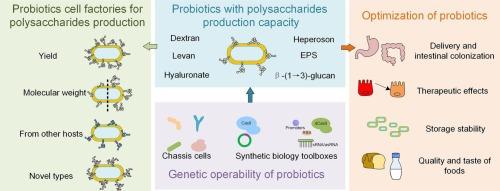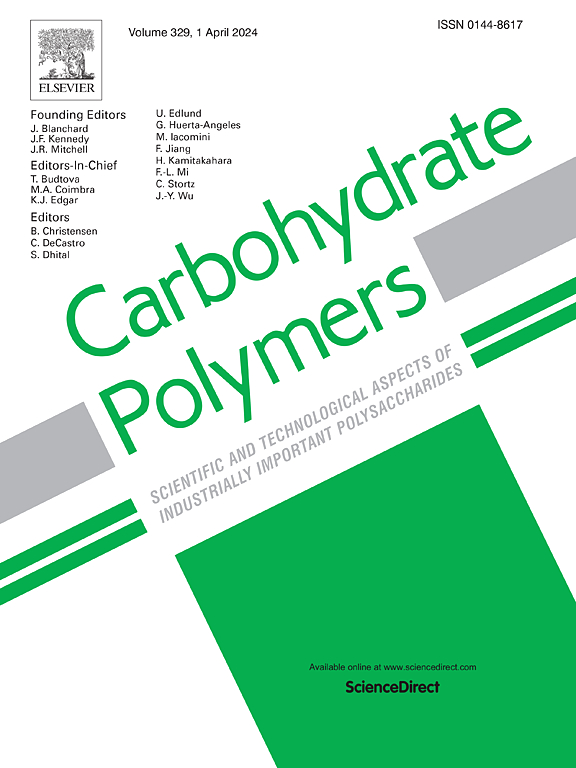利用多糖生产潜力优化和扩大益生菌的应用
IF 10.7
1区 化学
Q1 CHEMISTRY, APPLIED
引用次数: 0
摘要
某些益生微生物可以合成重要的生物产品,包括作为细胞结构或细胞外基质成分的多糖。益生菌多糖因其优异的特性和生物活性,已被广泛应用于食品、医药和医疗领域。多糖生产潜力的开发已成为促进益生菌生物技术应用的推动力。基于合成生物学的技术进步,最近在具有高效生物合成多糖能力的益生菌工程方面取得了重大进展。本综述概述了用于多糖生产的益生菌底盘和基因工具。然后,还清楚地介绍了益生菌多糖和相关的生物合成机制。接下来,我们介绍了通过调整代谢途径和整合益生菌中的表达元件来制备高产、分子量可控或非本地多糖的策略。最后,介绍了外源和原位多糖在益生菌的稳定性、生物活性和治疗效果方面的一些前瞻性和公认的贡献。我们的观点是推进益生菌中有价值的生物聚合物的高效生物制造,以及具有定制功能的益生菌工程,以开发益生菌的工业和生物医学应用。本文章由计算机程序翻译,如有差异,请以英文原文为准。

Harnessing the polysaccharide production potential to optimize and expand the application of probiotics
Certain probiotic microorganisms can synthesize important bioproducts, including polysaccharides as components of cellular structure or extracellular matrix. Probiotic-derived polysaccharides have been widely applied in food, pharmaceutical, and medical fields due to their excellent properties and biological activities. The development of polysaccharide production potential has become a driving force for facilitating biotechnological applications of probiotics. Based on technical advances in synthetic biology, significant progress has recently been made in engineering probiotics with efficient biosynthesis of polysaccharides. Herein, this review summarizes probiotics chassis and genetic tools used for polysaccharide production. Then, probiotic polysaccharides and relevant biosynthesis mechanisms are also clearly described. Next, we introduce strategies for preparing high-yield, controllable molecular weight or non-native polysaccharides by adjusting metabolic pathways and integrating expression elements in probiotics. Finally, some prospective and well-established contributions of exogenous and in situ polysaccharides in probiotics' stability, bioactivity, and therapeutic effects are presented. Our viewpoints on advancing the efficient biomanufacturing of valuable biopolymers in probiotics and engineering probiotics with customized features are provided to exploit probiotics' industrial and biomedical applications.
求助全文
通过发布文献求助,成功后即可免费获取论文全文。
去求助
来源期刊

Carbohydrate Polymers
化学-高分子科学
CiteScore
22.40
自引率
8.00%
发文量
1286
审稿时长
47 days
期刊介绍:
Carbohydrate Polymers stands as a prominent journal in the glycoscience field, dedicated to exploring and harnessing the potential of polysaccharides with applications spanning bioenergy, bioplastics, biomaterials, biorefining, chemistry, drug delivery, food, health, nanotechnology, packaging, paper, pharmaceuticals, medicine, oil recovery, textiles, tissue engineering, wood, and various aspects of glycoscience.
The journal emphasizes the central role of well-characterized carbohydrate polymers, highlighting their significance as the primary focus rather than a peripheral topic. Each paper must prominently feature at least one named carbohydrate polymer, evident in both citation and title, with a commitment to innovative research that advances scientific knowledge.
 求助内容:
求助内容: 应助结果提醒方式:
应助结果提醒方式:


